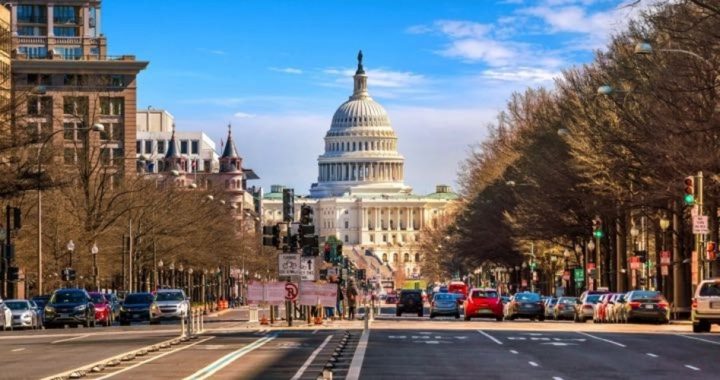
Podcast: Play in new window | Download ()
Subscribe: Android | RSS | More
Governor Kevin Stitt, an Oklahoma Republican, announced on Tuesday that he intends to open an office in Washington, D.C., and pick someone to be his liaison to the federal government. Governor Stitt’s spokeswoman, Donelle Harder, said, “Our hope is to have interviews done and have this completed by the end of the year.”
While many other states have also set up these types of offices in the nation’s capital, it is yet another illustration that the 17th Amendment, added to the U.S. Constitution in 1913, during the midst of the Progressive Era, delivered a severe blow to the system of federalism created by the framers of the U.S. Constitution.
The Constitution created a bicameral Congress, with the House of Representatives to represent the people of the United States directly, and a Senate, designed to represent the interests of the various states. At the time of the Constitution’s adoption in 1789, senators were to be chosen by the respective state legislatures for six-year terms, so these senators could be held accountable to the legislature of their state. The idea was that a proper balance between the states and the newly created general government would be more likely to be maintained if senators were elected by state legislatures. Senators, in other words, were expected to be jealous of any effort by the federal government to encroach upon the constitutionally protected powers of the states.
But then the 17th Amendment was passed, and instead of state legislatures electing the senators, the senators began being elected by all the voters of their respective states, making them little more than glorified House members.
Former Oklahoma Governor David Walters, a Democrat, first established a state office in D.C. in 1991, but his successor, Republican Frank Keating, shut down the office shortly after becoming governor of Oklahoma in 1995.
When Walters first opened the office in 1991, Senator Jim Inhofe (R-Oklahoma), then a member of the U.S. House of Representatives, opposed it. Speaking in 1995, Inhofe said, “I can remember when Governor Walters made his decision to have an office in Washington, we were opposed to it then, only to find out it was a done deal before we were consulted.”
But Stitt’s spokeswoman, Donelle Harder, said that members of the Oklahoma congressional delegation (which still includes Inhofe) are for Stitt’s action. “I believe why they want this is ultimately there was not a system within state government to have a good look at why federal dollars were being brought in, to make sure they were being accounted for correctly. I think they want to feel like what they’re advocating for in D.C. is going to be used at home and used well and matches the priorities of the state.”
Again, this seems to be the job of the Oklahoma congressional delegation, particularly the two U.S. senators — Jim Inhofe and James Lankford. Writing in Federalist, No. 9, Alexander Hamilton explained, “The proposed Constitution, so far from implying an abolition of the State governments, makes them constituent parts of the national sovereignty, by allowing them a direct representation in the Senate.” And, in Federalist, No. 39, James Madison explained that while the House of Representatives “will derive its powers form the people of America,” the Senate, “on the other hand, will derive its powers from the States as political and coequal societies.” He added that this aspect made the government “federal, not national.”
Madison, writing in Federalist, No. 62, explained further the reason that each state’s legislature should choose the U.S. senators from their state: “It is recommended by the double advantage of favoring a select appointment, and of giving to the State governments such an agency in the formation of the federal government as must secure the authority of the former.”
Casting aside this wisdom of Founders such as Madison and Hamilton, the Progressives of the early 20th century argued instead that “the people” should be able to elect directly the senators, same as members of the House, and agitated for what became the 17th Amendment, which stripped state legislatures of the power to elect senators.
Once this was accomplished, this important check that states had over the federal government, by controlling the U.S. Senate, was nullified. No longer is the Senate a bulwark against those who would centralize more and more power in the hands of the federal government, as the senators are no longer restrained by the concerns of those whose job it is to run state government. Combined with the passage of the 16th Amendment in the same year, which gave the federal government enormous sums of money through the income tax, it is not surprising that the original concept of federalism, envisioned by the Founding Fathers, is no longer in effect, and is not very well understood by the population.
While one cannot fault Governor Stitt for his frustration that Oklahoma’s state government has no real voice in D.C., he should really consider calling for repeal of the 17th Amendment.
Photo of Washington, D.C.: f11photo / iStock / Getty Images Plus
Steve Byas is a university history instructor and author of History’s Greatest Libels. He can be contacted at [email protected]



